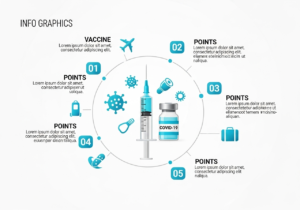What Is the DTP Vaccine?
The DTP vaccine is a combined immunisation that protects against three serious bacterial infections: diphtheria, tetanus, and polio. These are diseases many people consider rare today, but without continued vaccination, they could easily resurface—particularly in areas with low immunisation rates or inadequate healthcare infrastructure.
In the context of travel, the DTP vaccine becomes especially important. Travellers heading to regions where these diseases are still prevalent may be exposed to risks that are otherwise minimal in the UK. For healthcare professionals advising patients, understanding the key aspects of the DTP vaccine is vital when assessing pre-travel needs.
Breaking Down the Three Components
Diphtheria
Diphtheria is a highly contagious bacterial infection that affects the nose and throat. It’s caused by *Corynebacterium diphtheriae*, which produces a toxin leading to severe complications such as airway obstruction, heart failure, and nerve damage. While rare in Britain thanks to routine childhood immunisation, diphtheria remains a concern in parts of Asia, Eastern Europe, the Middle East, and Africa.
Symptoms can begin with a sore throat and fever but may rapidly progress to difficulty breathing and a characteristic grey-white coating on the tonsils or throat. In serious cases, it can be fatal.
Tetanus
Tetanus, sometimes known as “lockjaw”, is caused by the bacterium *Clostridium tetani*, typically found in soil, dust, and animal waste. The bacteria enter the body through cuts or wounds and release a neurotoxin that affects the nervous system.
Unlike diphtheria and polio, tetanus isn’t spread person-to-person. That makes vaccination the only reliable form of protection. It causes painfully stiff muscles, difficulty swallowing, and spasms that can last several weeks. It’s a particular concern for travellers engaging in outdoor activities, especially in rural or underdeveloped regions.
Polio
Polio, short for poliomyelitis, is a viral disease that attacks the nervous system, potentially leading to paralysis or death. Although largely eradicated in many parts of the world, polio has not been eliminated everywhere. Countries like Afghanistan and Pakistan still report occasional outbreaks, and strains of the virus have been detected in wastewater across parts of the globe—including Europe.
There is no cure for polio, so prevention through vaccination remains critical. The DTP vaccine contains an inactivated form of the virus, which cannot cause the disease but effectively prompts the immune system to develop protection.
Why Is the DTP Vaccine Important for Travellers?
When planning international travel, particularly to developing countries or remote areas, the risk of encountering these diseases can increase. Outbreaks can occur unexpectedly, and medical facilities in some regions may lack the resources to manage severe infections.
The DTP vaccine helps minimise these risks. Many countries require proof of vaccination for entry, especially during outbreaks or for long-term stays. This is particularly relevant for aid workers, backpackers, or those visiting friends and relatives abroad, who may have more prolonged exposure than short-term tourists.
Even if you’ve had the full course in childhood, immunity can wane over time. Adults may need a booster dose every ten years, especially if travelling to regions where these diseases remain a threat.
Who Needs the DTP Vaccine?
In the UK, the DTP vaccine is part of the standard childhood immunisation schedule, given in multiple doses during infancy and early childhood. Booster doses are typically administered during adolescence.
For adults, especially those who haven’t had a booster in the past decade, the vaccine may be recommended again—particularly before travel. Pregnant women may also receive the vaccine during pregnancy to protect both mother and baby from pertussis (whooping cough), which is sometimes included in combination vaccines like DTaP.
Travellers should consult a travel health specialist at least 6–8 weeks before departure to determine whether a DTP booster is needed. Those working in healthcare, emergency services, or humanitarian aid may require more frequent boosters due to occupational exposure.
Side Effects and Safety
The DTP vaccine is considered safe and well-tolerated. Like all vaccines, it can cause mild side effects such as soreness at the injection site, low-grade fever, or fatigue. These usually resolve within a day or two.
Serious side effects are extremely rare. It’s important for individuals with a history of severe allergic reactions to any component of the vaccine to discuss alternatives with their healthcare provider.
For travellers, the benefits of protection far outweigh the minimal risks. Contracting any of the diseases covered by the DTP vaccine can lead to severe health outcomes and disrupt travel plans—not to mention the potential for long-term complications.
When and Where to Get Vaccinated
Timing is crucial when it comes to travel vaccinations. Ideally, the DTP vaccine should be administered at least two weeks before departure to allow your immune system to respond fully. If you’re combining it with other travel vaccines, such as hepatitis A or typhoid, your travel clinic can coordinate the schedule efficiently.
While some general practices may offer the vaccine, travel clinics often provide the most comprehensive advice, especially for complex itineraries or high-risk destinations. Clinics like ours focus specifically on travel medicine, ensuring you’re covered for the exact requirements of your trip.
Helping You Travel Safely
Understanding the role of the DTP vaccine in safeguarding your health is just one step in preparing for international travel. Whether you’re heading off on a gap year, planning a jungle trek, or volunteering overseas, making sure your vaccinations are up to date is essential.
If you’re unsure about your vaccination history or need tailored advice based on your destination, our team is here to help. We offer expert consultations and a full range of travel vaccinations, including DTP boosters, to make sure you’re protected wherever your journey takes you.
Take the next step towards safer travel—book your appointment with us today.










